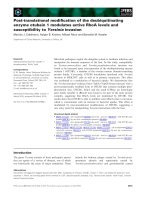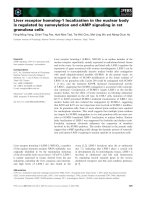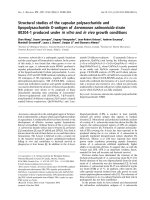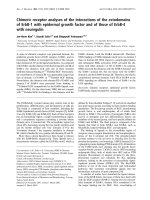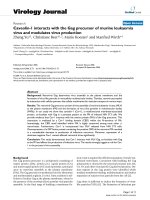slide 1 look at the clues and guess words w e l c o m e to da lat welcome look at the clues and guess words new old look at the clues and guess words school year school 2010 2011 students uniform in f
Bạn đang xem bản rút gọn của tài liệu. Xem và tải ngay bản đầy đủ của tài liệu tại đây (836.24 KB, 31 trang )
<span class='text_page_counter'>(1)</span><div class='page_container' data-page=1></div>
<span class='text_page_counter'>(2)</span><div class='page_container' data-page=2>
<i><b>Look at the clues and guess words</b></i>
<b>W</b>
<b>C</b>
<b>E</b>
<b>E</b>
<b>M</b>
<b>O</b>
<b>L</b>
</div>
<span class='text_page_counter'>(3)</span><div class='page_container' data-page=3>
<i><b>Look at the clues and guess words</b></i>
<b>NEW</b>
</div>
<span class='text_page_counter'>(4)</span><div class='page_container' data-page=4>
<i><b>Look at the clues and guess words</b></i>
<b>SCHOOL YEAR</b>
<i><b>SCHOOL</b></i>
<i><b>2010-2011</b></i>
<i><b>STUDENTS</b></i>
<i><b>UNIFORM</b></i>
</div>
<span class='text_page_counter'>(5)</span><div class='page_container' data-page=5>
<i><b>Look at the clues and guess words</b></i>
<b>SCHOOL YEAR</b>
<b>NEW</b>
</div>
<span class='text_page_counter'>(6)</span><div class='page_container' data-page=6></div>
<span class='text_page_counter'>(7)</span><div class='page_container' data-page=7>
1. Affirmative:
e.g: <i>I am</i> a student.
<i>She</i> <i>is</i> thirteen years old.
<i>These books</i> <i>are</i> new.
<b>* </b>THE PRESENT SIMPLE TENSE:
I. TO BE: AM / IS / ARE
I am
He/ She / It / Singular Nouns : is
You / We / They / Plural Nouns : are
2) Negative:
e.g: <i>He isn’t</i> a farmer.
<i>They</i> <i>aren’t</i> dentists.
<i>This house</i> <i>isn’t</i> big.
3) Interrogative:
e.g: <i>Is this </i>your book ?
<i>Are you </i>thirsty ?
<i>Is your brother </i>ten years old ?
Form: S + am / is / are + O
Form: S + am not / isn’t / aren’t + O
Is not = isn’t Are not = aren’t
</div>
<span class='text_page_counter'>(8)</span><div class='page_container' data-page=8>
<i>Exercise 1 : Supply the correct form of ‘ to be’</i>
a) I …… a student in grade 8.
b) She ……..pretty.
c) They ………in the classroom.
d) We ………teenagers.
<i>am </i>
<i>is </i>
<i>are</i>
<i>are</i>
</div>
<span class='text_page_counter'>(9)</span><div class='page_container' data-page=9>
1. Affirmative:
E.g: <i>I play</i> baseball every morning.
<i>She</i> <i>walks</i> to school every day.
<i>He watches</i> television after work.
<b>* </b>THE PRESENT SIMPLE TENSE:
II. ORDINARY VERBS:
S + V-s/es + O
-I/ You/ We/ They and Plural Nouns + V (inf.)
-He/ She/ It and Singular Nouns + V-s/es
( Verbs end with : s / sh / o / x / ch / z -> es )
Eg: She goes to school by bike.
</div>
<span class='text_page_counter'>(10)</span><div class='page_container' data-page=10>
2. Negative:
E.g: <i>They don’t go </i> to work on Sundays.
<i>Lan</i> <i>doesn’t play </i> video games.
<i>He doesn’t get up </i>late in the morning.
<b>* </b>THE PRESENT SIMPLE TENSE:
II. ORDINARY VERBS:
S + don’t / doesn’t + V ( inf.) + O
Form:
-I/ You/ We/ They and Plural Nouns + don’t
-He/ She/ It and Singular Nouns + doesn’t
<i>do not = don’t </i>
</div>
<span class='text_page_counter'>(11)</span><div class='page_container' data-page=11>
3. Interrogative:
E.g: <i>Do you like pop music ?</i>
<i>Does he go swimming after school ?</i>
<b>* </b>THE PRESENT SIMPLE TENSE:
II. ORDINARY VERBS:
Do / Does+ S + V ( inf.) + O…?
Form:
Do + I/ You/ We/ They and Plural Nouns
Does + He/ She/ It and Singular Nouns
Yes, I do. / No, I don’t.
</div>
<span class='text_page_counter'>(12)</span><div class='page_container' data-page=12>
<i>Exercise 3 : Supply the verbs in present simple</i>
a) I ( watch ) TV after school.
b) She ( go ) jogging twice a week.
c) My mother ( work ) in a hospital.
d) He ( not like ) pop music.
e) They ( not have ) History on Friday.
f) You ( ride ) a bike to school?
g) Your father ( teach ) English ?
a) I watch TV after school.
b) She goes jogging twice a week.
c) My mother works in a hospital.
d) He doesn’t like pop music.
e) They don’t have History on Friday.
f) Do you ride a bike to school?
</div>
<span class='text_page_counter'>(13)</span><div class='page_container' data-page=13>
1. Affirmative:
e.g: <i>I am studying</i> English now.
<i>She</i> <i>is writing</i> her lesson.
<i>They are running</i> around the school yard.
<b>* </b>THE PRESENT PROGRESSIVE TENSE:
S + am / is / are + V-ing + O…
Form:
write ing
runn ing
2. Negative:
e.g: <i>I amnot studying</i> English now.
<i>She</i> <i>isn’t writing</i> her lesson.
<i>They aren’t running</i> around the school yard.
Form: S + am / is / are + not + V-ing + O…
3. Interrogative:
e.g: <i>Are you</i> <i>studying</i> English now ?
<i>Is</i> <i>she</i> writing her lesson ?
<i>Are they</i> <i>running</i> around the school yard?
</div>
<span class='text_page_counter'>(14)</span><div class='page_container' data-page=14>
<i>Exercise 4: Supply the verbs in present </i>
<i>progressive: </i>
a) I ( watch ) TV now.
b) She ( go ) to the post office.
c) My mother (cook) in the kitchen.
d) He ( not drive ) his car.
e) They ( not play ) volleyball.
f) She ( ride ) a bike?
g) You ( cut ) an apple ?
a) I am watching TV now.
b) She is going to the post office.
c) My mother is cooking in the kitchen.
d) He isn’t driving his car at the moment.
e) They aren’t playing volleyball.
f) Is she riding a bike?
</div>
<span class='text_page_counter'>(15)</span><div class='page_container' data-page=15>
1. Affirmative:
E.g: <i>She is going to</i> <i>see a movie.</i>
<i>They are going to</i> <i>watch a soccer match.</i>
<b>* </b>THE NEAR FUTURE TENSE:
S + am / is / are + going to + V (inf.)+ O
Form:
2. Negative:
e.g:<i>She isn’t going to see a movie.</i>
<i>They aren’t going to watch a soccer match.</i>
Form:
S + am/is/are+not+ going to + V (inf.)+ O
3. Interrogative:
e.g: <i>Is</i> <i>she going to</i> <i>see a movie?</i>
<i>Are they going to</i> <i>watch a soccer match?</i>
</div>
<span class='text_page_counter'>(16)</span><div class='page_container' data-page=16>
<i>Exercise 5: Supply the verbs in near future </i>
a) I ( visit ) my grandmother tomorrow .
b) Lan ( do ) her homework tonight.
c) We ( have ) dinner at home.
d) He ( not drive ) his car to work.
e) They ( not play ) soccer on the street.
f) Dr. John ( meet ) his patent?
g) You ( travel ) to Ha Noi ?
a) I am going to visit my grandmother tomorrow .
b) Lan is going to do her homework tonight.
c) We are going to have dinner at home.
d) He isn’t going to drive his car to work.
e) They aren’t going to play soccer on the street.
f) Is Dr. John going to meet his patent?
</div>
<span class='text_page_counter'>(17)</span><div class='page_container' data-page=17>
1. Affirmative:
E.g: <i>She will</i> <i>be a doctor next year.</i>
<i>They will</i> <i>go to the seaside tomorrow.</i>
<b>* </b>THE FUTURE SIMPLE TENSE:
</div>
<span class='text_page_counter'>(18)</span><div class='page_container' data-page=18>
<i>Exercise 5: Supply the verbs in near future </i>
a) I ( visit ) my grandmother tomorrow .
b) Lan ( do ) her homework tonight.
c) We ( have ) dinner at home.
d) He ( not drive ) his car to work.
e) They ( not play ) soccer on the street.
f) Dr. John ( meet ) his patent?
g) You ( travel ) to Ha Noi ?
a) I am going to visit my grandmother tomorrow .
b) Lan is going to do her homework tonight.
c) We are going to have dinner at home.
d) He isn’t going to drive his car to work.
e) They aren’t going to play soccer on the street.
f) Is Dr. John going to meet his patent?
</div>
<span class='text_page_counter'>(19)</span><div class='page_container' data-page=19>
2. Negative:
E.g: <i>We won’t play computer games.</i>
<i>He won’t</i> <i>get up late tomorrow.</i>
<b>* </b>THE FUTURE SIMPLE TENSE:
S + won’t + V (inf.)+ O…
Form:
</div>
<span class='text_page_counter'>(20)</span><div class='page_container' data-page=20>
3. Interrogative:
E.g: <i>Will she take some photos ?</i>
<i>Will they drive to the countryside ?</i>
<b>* </b>THE FUTURE SIMPLE TENSE:
</div>
<span class='text_page_counter'>(21)</span><div class='page_container' data-page=21>
<i>Exercise 6: Supply the verbs in future simple </i>
a) I ( visit ) my grandmother tomorrow .
b) Lan ( do ) her homework tonight.
c) We ( have ) dinner at home.
d) He ( not drive ) his car to work.
e) They ( not play ) soccer on the street.
f) Dr. John ( meet ) his patent?
</div>
<span class='text_page_counter'>(22)</span><div class='page_container' data-page=22>
1. Affirmative:
E.g: <i>She was at home yesterday.</i>
<i>They were at the party last night.</i>
<b>* </b>THE PAST SIMPLE TENSE:
S + was / were + O…
Form:
I. To be : was / were
I/ He/ She / It / Singular Nouns : was
</div>
<span class='text_page_counter'>(23)</span><div class='page_container' data-page=23>
2. Negative:
E.g: <i>She wasn’t at home yesterday.</i>
<i>They weren’t at the party last night.</i>
<b>* </b>THE PAST SIMPLE TENSE:
S + wasn’t / weren’t + O…
Form:
I. To be : was / were
</div>
<span class='text_page_counter'>(24)</span><div class='page_container' data-page=24>
3. Interrogative:
E.g: <i>Was she at home yesterday?</i>
<i> Were they at the party last night?</i>
<b>* </b>THE PAST SIMPLE TENSE:
S + was / were + O…
Form:
</div>
<span class='text_page_counter'>(25)</span><div class='page_container' data-page=25>
1. Affirmative:
a) Regular verbs :
E.g: <i>She play the piano last night.</i>
<i>They walk to school yesterday.</i>
b) Irregular verbs :
<i>E.g: I go to the supermarket last Sunday.</i>
<i>He buy a new car two weeks ago.</i>
<b>* </b>THE PAST SIMPLE TENSE:
S + V-ed/2 + O…
Form:
<i>ed</i>
<i>ed</i>
<i>went</i>
<i>bought</i>
</div>
<span class='text_page_counter'>(26)</span><div class='page_container' data-page=26>
2. Negative:
E.g: <i>She play the piano last night.</i>
<i>I went to the supermarket last Sunday.</i>
<b>* </b>THE PAST SIMPLE TENSE:
S + didn’t +V (inf.) + O…
Form:
<i>ed</i>
<i>didn’t go</i>
<i>didn’t </i>
</div>
<span class='text_page_counter'>(27)</span><div class='page_container' data-page=27>
3. Interrogative:
E.g: <i>She played the piano last night. </i>
<i>He bought a new car two weeks ago.</i>
<b>* </b>THE PAST SIMPLE TENSE:
Did + S + V (inf.) + O…?
Form:
<i>Did</i> <i>she play the piano last night? </i>
<i> </i>
</div>
<span class='text_page_counter'>(28)</span><div class='page_container' data-page=28>
<i>Exercise 7: Supply the verbs in past simple </i>
a) I ( visit ) my grandmother yesterday .
b) Lan ( do ) her homework last night.
c) We ( have ) a nice party.
d) He ( not drive ) his car to work.
e) They ( not play ) soccer on the street.
f) Dr. John ( meet ) his patent?
g) You ( travel ) to Ha Noi ?
h) She ( be ) in Hue last summer.
i) They ( not be ) at home two days ago.
a) I visited my grandmother yesterday .
b) Lan did her homework last night.
c) We had a nice party.
d) He didn’t drive his car to work.
e) They didn’t play soccer on the street.
f) Did Dr. John meet his patent?
g) Did you travel to Ha Noi by plane?
h) She was in Hue last summer.
</div>
<span class='text_page_counter'>(29)</span><div class='page_container' data-page=29>
<i>Exercise 8: Supply the correct form of verbs </i>
a) I ( go ) to Vung Tau yesterday.
b) She ( visit )her grandmother tomorrow.
c) My mother (cook) lunch in the kitchen now.
d) He often (play) volleyball with his friends.
<b>Key :</b>
a) I went to Vung Tau yesterday.
b) She will visit her grandmother tomorrow.
c) My mother is cooking lunch in the kitchen now.
</div>
<span class='text_page_counter'>(30)</span><div class='page_container' data-page=30>
• <sub>Review the tenses </sub>
• <sub>Prepare </sub>
</div>
<span class='text_page_counter'>(31)</span><div class='page_container' data-page=31></div>
<!--links-->


